Mariana Castro Heath has traveled around the world for her studies and her archeological work. Born and raised in Lisbon, Portugal, Mariana graduated with a BA in Archeology and Anthropology with Honors at BYU, and is now an Ertegun Scholar and MPhil Candidate in Classical Archeology at the University of Oxford. She has been described as a “Renaissance Woman”—her love for archeology, film, photography, journalism, and the Gospel show an insatiable desire to keep learning throughout her life and bring beauty to the world. Challenges in the archeological field have helped her be more self-aware, and have taught her that God loves all of His children, no matter what time period or culture.
Tell me about your love for archeology. Where did that love start and what made you want to pursue that path?
I didn’t know I wanted to be an archeologist until my last year in high school. It was not my childhood dream like it is for most people. When I tell people, “I’m an archeologist,” people say, “Oh, I’ve always wanted to be an archeologist,” but when I was a child, I didn’t. What I did love growing up was history. I loved it when people told me little stories or big stories. I just loved them. I grew up in Portugal with my grandma and my dad telling me a lot of stories. When I got to fifth grade, that’s when I really started receiving more of a history education, and I realized that I loved it. But I also loved other things; I loved other disciplines.
History was the discipline I was best at. But I also loved photography. I received my first camera in fifth grade, and I started documenting everything. For a very long time I wanted to be a photographer or photojournalist because it would allow me to travel and allow me to see all of these wonderful places that I had heard about, but at the same time it would allow me to document them and keep them safe. It was only when I became much older that I realized that archeology was just such a perfect combination of everything I wanted to do. I realized that my passion was not really photography or history, my passion was documenting. My passion was to document things and to not lose them. I guess that terrifies me, the loss of moments and of experiences and of history. At the same time, archeology would allow me to travel and to see the world and engage in the communities at a deeper level than just being a tourist or just being an outsider photographer. With archeology you are actually living with people and learning about their lives. It was a perfect combination.

Mariana biking with her grandmother in Greece
Was there a specific moment that helped you realize that archeology combined your love of documenting and your love of history?
I only realized this a lot more recently. I think when I was making the decision to study archeology, my decision was much more driven by realizing that all the other things I loved—theatre, cinema, photography, and journalism—could be learned without going to college. Archeology, in the middle of all these things, was the only one where I had to go to college. But, the realization of my love of documenting has come from a lot of different things, and not just archeology. It has come from me doing genealogy work, continuing my passion for photography, and trying to become a little more self-aware. Through that process, I realized that all of my passions combine, and what they all have in common is this documentation process. For example, I have a blog, where I don’t write anything at all, but I put everything I learn about the stories of my family, and my photographs, and every time I see something beautiful that I think is going to get lost on YouTube or Google, I put it there too so that everything is very well-archived. And so one day, if someone needs to find a little package of beautiful things about humanity, it will be there.
Documenting is important to you because you don’t want beautiful things to be lost. In your work—in your digs and in your studies—what does it feel like to re-discover something that was forgotten for so many years?
The process of rediscovery is constant in the field and in my studies. In the field is a completely different experience because you’re uncovering things and people for the first time in 2000 years. The sites that I’ve excavated in Petra, for example. In my studies, I’m often reading things that other people haven’t uncovered. It’s a little bit like uncovering it again, because a lot of these things are in books or reports that nobody has looked at in 50 years! But reading those reports is a different feeling than on the sites, because it’s not as new—it’s not you being the first person to touch it since the person who owned it touched it, so it’s a different connection.
But in Petra, for example, I often have the experience of being the first person to touch something again, especially when digging graves. It’s particularly special when you find a body, because suddenly you realize, wait, this is actually a person. He’s the same height as my brother. Perfect teeth. He was probably a good-looking young man, about my age. And he’s here, lying with a rock in his head. So those experiences are really, really interesting.
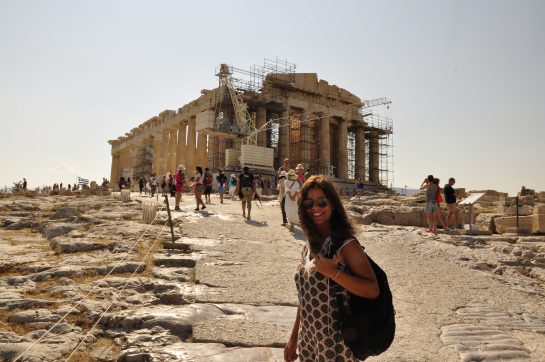
Mariana at the Acropolis in Athens
It’s a very spiritual experience to do archaeology, because it’s the Spirit of Elijah in its ultimate degree! You are making a connection with someone whose name you don’t know, but you think, “What will it be when this person and I meet? I knew so much about you without knowing anything about you.” It’s very profound in that sense. But then we also find beautiful shiny things like gold and jewelry, and that’s also very exciting. On one hand you have humanity, but on the other you have everything that humanity is able to do with the world. It’s just amazing to see the creative potential of human beings. You find things you would never expect to find. And it just adds to how amazing humanity is.
How do you view the role of archeology in today’s world?
I think an important role of archeology, especially nowadays when it is very difficult to explain to people the value of humanities, is by showing how the past can help us lead a more meaningful present. The way I find my work more meaningful is by applying everything I learn in archelogy to everything I can do in the present. Archaeology, for example, impacts the way modern people perceive and shape their identity. In that sense we have an incredible responsibility not only to individuals but to regions, states, and international relations. Imagine for example the debate over the Parthenon marbles, or the Bust of Nefertiti. People today are desperately engaged in the past through political debates over who owns artifacts that belong to their “millennial cultures,” which is in itself highly debatable. We also have the responsibility to deliver unbiased knowledge about the past, educate the next generation, and protect sites that are being destroyed and looted as we speak.
What are some other lessons archeology has taught you?
I have learned to see people different than me as children of God. On one hand you have dead people teaching you all of these amazing and unexpected things about humanity and our millennial connection with the divine, but on the other hand you are living with all of these living people who also teach you other things about humanity that you never thought about. People who believe in completely different things than you do. People who are nomads from the desert, and they still think that they are descendants of these ancient people. People who cannot really see past tomorrow. People who live in a community and who are much more focused on family and tribal connections than they are on individualistic pursuits, for example. Living with these people and working with these people has taught me so much. Engaging with people so different from me expands my comprehension of what a human being can be, and how vast and diverse God’s love for all his children actually is.
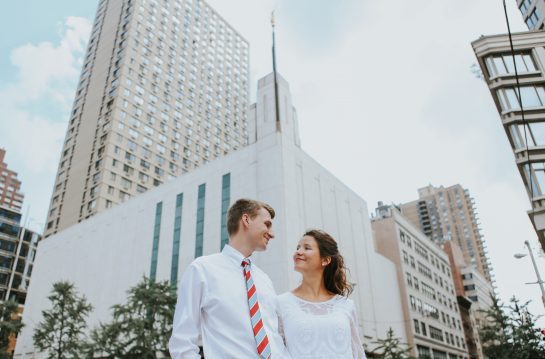
Mariana on her wedding day in Manhattan
You mentioned that archeology gives you a deeper experience than just being a tourist or an outside photographer. Do you have some examples of that?
Absolutely. Archeology makes you go outside your comfort zone. And you become more than yourself when you go outside of your comfort zone. Let me tell you, living with Bedouin women and men is going outside of your comfort zone. The same goes for other places. When I excavated in Belize, I lived with Mexican and Guatemalan people, and that was a different experience than living with Bedouin. Those are people that you don’t really meet unless you go on these archeological excursions. As an archeologist, you meet people at a deeper level. They are our hosts, and in that capacity we have a relationship of trust and understanding. They become your friends; they become your family. They really do. They feed you. They give you a house. And when you leave they say, “always come back.”
How would you say that the love of God has influenced your profession?
It’s just made me so much more patient and kind. I’m pushed to be the best of myself around these people because I not only owe them so much, but because of their example. Because they are so wonderful to me, a foreigner. I’m not saying that people where I live are not as wonderful, but it’s a different type of mentality in the Middle East. Where I work and why I like to work there is in part not because of the dead or archeology, but because of the living people who remind me to be better. And to see how these people discuss and read the Quran has also been enlightening. They have such a love for God, even in the most remote places. I become a better professional by interacting with these people and by letting them expand my range of human experience.
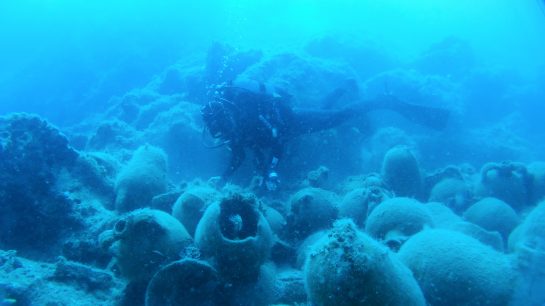
Underwater archaeology in Greece
You’ve been all over the world for archeology and for school. Right now you are pursuing an MPhil at the University of Oxford. Why did you choose Oxford for your higher education?
I chose Oxford because I wanted to have the experience of going to university with the type of education that was different than the American education. I wanted to get the largest range of education I could get, and to get the other side of the spectrum. In America, archeology is taught very differently than in Britain. I had an American education at BYU, but I also wanted the British education. Oxford seemed like an obvious choice because it’s one of the best universities in the world, it has one of the best programs in archeology in the world, and it has a supervisor who I thought I could work really well with. And in the end it was also because I was blessed with funding through the Ertegun Scholarship Programme. And who doesn’t want to live the Harry Potter experience?
Everyone, obviously. But of course, we know that Oxford is not Harry Potter. Oxford is an incredible experience, but it’s also really hard. What are some of the challenges that you’ve experienced at Oxford and what has helped you overcome them?
I think the answer to that question is that an Oxford education is not made to make you feel good about yourself. It’s really made to make you realize how ignorant you are. But if there’s something that Oxford has taught me, it’s how to think more critically. I’ve become a lot more critical of the things I hear. I’m not skeptical, but I take everything with a grain of salt, especially if it’s not sourced by three people. At the same time, Oxford is such a unique place because you’re dealing with people from all over the world, especially at a graduate level. It’s fascinating. It has been so great for my education because these people know what they’re saying and are so educated. It’s so inspiring.
But at the same time it’s a little bit frustrating, because you realize that I do not have the personality to become like them. I could never be that invested in just one thing. I have had to do some serious soul searching. I’m much more like a Renaissance woman. I like a lot of things, and I just don’t see myself focusing on one area, or one culture, or one field of research for the rest of my life. It’s just not my personality. In that respect, Oxford has helped me to gain and to know myself. I thought that academia is what I wanted to do. I thought this was all I wanted to do. But the more time I spend here, the more I realize that I do not want to constrain myself. I want to do the opposite. I want to enlarge my horizons. So maybe that’s a good thing. Oxford has helped me to realize how much bigger everything can become and I do not regret coming here.
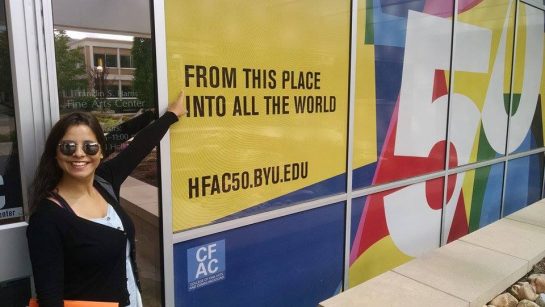
Mariana on her last day at BYU
What do you see your life becoming? And how have your years at Oxford taught you to become more self-aware?
Ideally, I would like to be a part-time professor and I would also like to spend time raising a family. I think that’s important as well. But you really do have to know yourself. Like it’s said at the Temple of Apollo at Delphi, “Know thyself.” I really believe that. You need to know how you are going to be happy. Oxford has taught me that I’m not super in love with academia, which is an important thing to know about myself. It has also taught me how good I feel being a little bit more domestic sometimes. I think ideally, the path of life that would not make me go insane would be to be a part-time professor, without all the pressures of being a tenured professor, but still being able to teach. I love teaching.
Where did you gain your love for teaching?
When I taught Sunday School at BYU. I taught Old Testament and it was great. I really gained a passion for sharing insights. There’s something transcendental about having an epiphany and sharing it with other people. I love that. And I think we should all do that. Also, I love being open about questions and doubts and complexes that we all have. I am becoming a lot more comfortable with sharing my complexes with people, being honest with how I see myself. And that has really helped me to realize that what I think of myself is not what other people think of me, which is healthy. Teaching has helped me to become a lot more confident and healthy and insightful, and it motivates me to be more intelligent. So that is something I know about myself—that I love teaching.
I think the only way I will not go insane is by dividing my life between the things that I love instead of just focusing on just family or just focusing on just work. I don’t think that will bring me a lot of happiness. But ideally, I would have an archeological project, take my children into the field, show them the archeology, be a part-time professor, and also take time to be at home. Ideally, that’s my life.
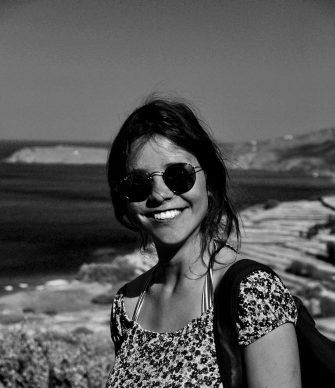
How do you feel God’s hand directing your life? Do you feel His hand?
Sometimes I struggle with the silence of God. I know rationally that God cannot forget me. But sometimes the silence lasts for so long and it’s so intense no matter how hard I plead for some direction and guidance in my life, and that is hard.
Something that taught me about the silence of God was actually the movie “Silence,” which I saw a few days ago. The movie is rated R and very violent, but I learned a lot from it. The movie is about priests—Portuguese Jesuit priests—who go to Japan in the 17th century to try to convert the Japanese to Christianity, but they are faced with all sorts of persecution. They are all killed and tortured. In the end, there is this last priest who has survived by assimilating to Japanese culture. They basically tell him that he can either join them or die. So he joins them. And in the end, he realizes that even though God was silent to him, God spoke through him to other people. That’s how God spoke, through this missionary’s actions. That was a powerful lesson for me.
Also in those moments when I struggle with silence, I remember that scripture in Isaiah—“Can a mother forget her suckling child? Yes, but I will not forget thee” (Isaiah 49:10). That’s one of my favorite scriptures because it reminds that despite all the silence in my decisions in how I want to lead my life, I know He somehow must be approving, because He has promised never to forget me. Another thing that helps me is something my dad told me: we are here to discover our value, not to prove it to the Father. The Father already knows our worth, so we’re here to discover who we really are. Archeology is the life path that has helped me the most in discovering who I am and my limits. My physical limits, my psychological limits, my emotional limits. It’s a challenging profession. But it’s so rewarding.
The challenges of archeology and the self-awareness it brings reminds me of this scripture, Romans 12:2. “Do not be conformed to this world, but be transformed by the renewal of your mind, that by testing you may discern what is the will of God, what is good and acceptable and perfect.” Isn’t that amazing? That all of these things need to be seen in an eternal perspective, and when we do that, they become so much more meaningful. It’s so beautiful to see how we renew our minds every time we do something that challenges us. For me, Oxford is like that, archeology is like that. They challenge me and renew my life.
At A Glance
Name: Mariana Castro Heath
Age: 24
Location: Oxford, United Kingdom
Marital History: Married
Children: 0
Occupation: Graduate student
Convert?: Born in the church
Schools Attended: BYU, University of Oxford
Languages Spoken at Home: Portuguese, English
Favorite Hymn: How Firm a Foundation
Website: http://the-sky-is-purple.weebly.com/
Interview Produced by Megan Armknecht
